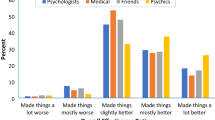Abstract
Clergy (N = 179) in the catchment areas of four hospitals in New York and Connecticut were surveyed about their pastoral care activities. Factor analysis revealed two separate sets of problems presented in pastoral counseling, with respect to clergy’s ratings of their competence to address them. The first factor included grief, death and dying, anxiety, and marital problems, in descending order of frequency. The second factor consisted of depression, alcohol/drugs, domestic violence, severe mental illness, HIV/AIDS, and suicide. Clergy were significantly less confident of their ability to deal with Factor 2 problems, yet clergy rarely consulted with mental-health professionals about either type of problem. Less than half of the clergy had training in Clinical Pastoral Education, but those who did tended to feel they were more competent to deal with both types of problems. On average, clergy devoted 3.7 hours per week to visiting patients and nearly 55% said they were “definitely more likely” to refer a patient to a hospital with a pastoral care department.
Similar content being viewed by others
References
Abramczyk, L. W. (1981). The counseling function of pastors: A study in practice and preparation. Journal of Psychology and Theology, 9(3), 257–265.
Bell, R. A., Morris, R. R., Holzer, C. E., & Warheit, G. J. (1976). The clergy as a mental health resource: Parts I and II. The Journal of Pastoral Care, 30(2), 103–115.
Bentz, W. K. (1970). The clergy’s role in community mental health. Journal of Religion and Health, 9(1), 7–15.
Bradley, M. B., Green, N. M., Jones, D. E., Lynn, M., & McNeil, L. (1990). Churches and church membership in the United States, 1990. Atlanta, GA: Glenmary Research Center.
Faiver, C. M., O’Brien, E. M., & McNally, C. J. (1998). “The friendly clergy:” Characteristics and referral. Counseling and Values, 42(3), 217–221.
Gallup, G. G., & Lindsay, D. M. (1999). Surveying the religious landscape: Trends in U.S. beliefs. Harrisburg, PA: Morehouse Publishing.
Gilbert, M. G. (1981). The decision of Assemblies of God pastors to counsel or refer. Journal of Psychology and Theology, 9(3), 250–256.
Givens, R. J. (1976). The counseling ministry of the churches of Christ. Journal of Psychology and Theology, 4(4), 300–303.
Holcomb, W. C. (1987). Promoting collaborative aftercare: Tapping support within the religious community for both mental health clients and agencies. Psychosocial Rehabilitation Journal, 10(3), 63–75.
Hong, B. A., & Wiehe, V. R. (1974). Referral patterns of clergy. Journal of Psychology and Theology, 2(4), 291–297.
Ingram, B. L., & Lowe, D. (1989). Counseling activities and referral practices of rabbis. Journal of Psychology and Judaism, 13(3), 133–148.
Johnson, P. E. (1973). The church’s mission to mental health. Journal of Religion and Health, 12(1), 30–40.
Koenig, H. G. (1998). Religious attitudes and practices of hospitalized medically ill older adults. International Journal of Geriatric Psychiatry, 13(4), 213–224.
Koenig, H. G. (2002). An 83-year-old woman with chronic illness and strong religious beliefs. Journal of the American Medical Association, 288(4), 487–493.
Koenig, H. G., Cohen, H. J., Blazer, D. G., Pieper, C., Meador, K., Shelp, F., et al. (1992). Religious coping and depression among elderly, hospitalized medically ill men. American Journal of Psychiatry, 149(12), 1693–1700.
Koenig, H. G., George, L. K., & Peterson, B. L. (1998). Religiosity and remission of depression in medically ill older patients. American Journal of Psychiatry, 155(4), 536–542.
Lowe, D. W. (1986). Counseling activities and referral practices of ministers. Journal of Psychology and Christianity, 5(1), 22–29.
Mannon, J. D., & Crawford, R. L. (1996). Clergy confidence to counsel and their willingness to refer to mental health professionals. Family Therapy, 23(3), 213–231.
Meylink, W. D., & Gorsuch, R. L. (1988). Relationship between clergy and psychologists: The Empirical data. Journal of Psychology and Christianity, 7(1), 56–72.
Mollica, R. F., Streets, F. J., Boscarino, J., & Redlich, F. C. (1986). A community study of formal pastoral counseling activities of the clergy. American Journal of Psychiatry,143(3), 323–328.
Mueller, P., Plevak, D., & Rummans, T. (2001). Religious involvement, spirituality, and medicine: Subject review and implications for clinical practice. Mayo Clinic Proceedings, 76, 1766–1771.
Orthner, D. K. (1986). Pastoral counseling: Caring and caregivers in the United Methodist Church. Athens, GA: University of Georgia.
Perlmutter, F., Yudin, L. W., & Heinemann, S. H. (1974). Awareness of a community mental health center among three “gatekeeper” groups. American Journal of Community Psychology, 2(1), 23–33.
Satcher, D. (2000). Mental health: A report of the Surgeon General—executive summary. Professional Psychology: Research and Practice, 31(1), 15–23.
United States Department of Labor. (1998).Occupational outlook handbook. Washington, DC: Bureau of Labor Statistics.
VandeCreek, L., & Burton, L. (2001). Professional chaplaincy: Its role and importance in healthcare. Journal of Pastoral Care, 55(1), 81–97.
Virkler, H. A. (1979). Counseling demands, procedures, and preparation of parish ministers: A descriptive study. Journal of Psychology and Theology, 7(4), 271–280.
Walters, J., & Neugeboren, B. (1995). Collaboration between mental health organizations and religious interventions. Psychiatric Rehabilitation Journal, 19(2), 51–57.
Weaver, A. J., Revilla, L. A., & Koenig, H. G. (2001). Counseling families across the stages of life: A handbook for pastors and other helping professionals. Nashville, TN: Abingdon Press.
Winet, R. A., Majors, J. S., & Stewart, G. (1979). Mental health treatment and referral practices of clergy and physician caregivers. Journal of Community Psychology, 7, 318–323.
Wood, N. S. (1996). An inquiry into pastoral counseling ministry done by women in the parish setting. The Journal of Pastoral Care, 50(4), 341–348.
Wright, P. G. (1984). The counseling activities and referral practices of Canadian clergy in British Columbia. Journal of Psychology and Theology, 12(4), 294–304.
Author information
Authors and Affiliations
Corresponding author
Rights and permissions
About this article
Cite this article
Moran, M., Flannelly, K.J., Weaver, A.J. et al. A Study of Pastoral Care, Referral, and Consultation Practices Among Clergy in Four Settings in the New York City Area. Pastoral Psychol 53, 255–266 (2005). https://doi.org/10.1007/s11089-004-0556-3
Issue Date:
DOI: https://doi.org/10.1007/s11089-004-0556-3



